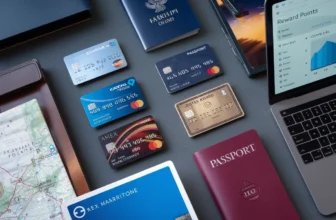
5 Ways to Improve Your Credit Score
Disclosure: This site may contain some affiliate links, but not every link. If you sign up or make a purchase through these links, I may receive a commission at no additional cost to you. However, all opinions are my own.
In the complex world of personal finance, few numbers hold as much power as your credit score. Whether you’re applying for a loan, seeking a new credit card, or even renting an apartment, your credit score plays a crucial role in determining your financial opportunities. In this article, we’ll explore five effective ways to improve your credit score, demystifying the process and empowering you to take control of your financial well-being.
Understanding Credit Scores
Basics of Credit Scores: Credit scores, typically ranging from 300 to 850, provide a snapshot of your creditworthiness. The higher your score, the more trustworthy you appear to lenders.

Factors Influencing Credit Scores: Various factors contribute to your credit score, including payment history, credit utilization, length of credit history, types of credit in use, and recent credit inquiries.
Check Your Credit Report
Importance of Checking Your Credit Report: Regularly reviewing your credit report is essential for spotting errors, unauthorized accounts, or fraudulent activities that could negatively impact your score.
Identifying Errors and Discrepancies: Inaccuracies in your credit report can drag down your score. Dispute any discrepancies promptly to ensure an accurate reflection of your financial history.
Also Read: Best Credit Cards for Business Owners
Timely Payments
The Significance of Paying Bills on Time: Consistent, on-time payments are a cornerstone of a positive credit history. Late payments can have a detrimental effect on your score.
Setting Up Automatic Payments: Take advantage of technology by setting up automatic payments for bills. This ensures you never miss a due date, safeguarding your credit score.
Reduce Credit Card Balances
Impact of High Credit Card Balances: High credit card balances relative to your credit limit can harm your credit score. Aim to keep your credit utilization below 30% to demonstrate responsible credit management.
Strategies to Reduce Credit Card Debt: Develop a plan to pay down credit card balances strategically. Consider consolidating debt, negotiating lower interest rates, or using windfalls like tax refunds to make significant payments.
Also Read: Best Credit Cards for Women
Diversify Your Credit Mix
The Role of Different Types of Credit Accounts: Having a mix of credit types, such as credit cards, installment loans, and mortgages, can positively impact your score. It demonstrates your ability to manage various financial responsibilities.
Balancing Credit Types Responsibly: While diversifying credit is beneficial, it’s crucial to manage each type responsibly. Avoid opening unnecessary accounts and only take on credit you can handle.
Avoid Opening Too Many Accounts
The Impact of Multiple Credit Inquiries: Frequent credit inquiries, especially within a short timeframe, can raise red flags for lenders. Be cautious about opening new accounts, as each inquiry can slightly impact your score.
Being Cautious About Opening New Accounts: Before opening a new account, evaluate the necessity and potential impact on your credit score. Only open new accounts when absolutely needed.
Length of Credit History Matters
Understanding the Importance of Credit History Length: The length of your credit history matters. Avoid closing old accounts, as they contribute positively to the length of your credit history.
Tips for Maintaining a Positive Credit History: Keep older accounts active and in good standing. Responsible, long-term credit management is key to a higher credit score.
Also Read: Best Credit Cards for Men
Handle Debts Wisely
Dealing With Outstanding Debts: If you have outstanding debts, tackle them strategically. Prioritize high-interest debts and consider debt consolidation if it aligns with your financial goals.
Seeking Professional Advice If Needed: If your debts are overwhelming, seek advice from financial professionals who can guide you through debt management strategies.
Be Patient and Consistent
Realistic Expectations for Credit Score Improvement: Improving your credit score is a gradual process. Set realistic expectations and focus on consistent, positive financial habits.
Consistency in Financial Habits: Consistency is key. Regularly practicing good financial habits will lead to long-term improvements in your credit score.
Benefits of a Good Credit Score
Lower Interest Rates: A higher credit score opens the door to lower interest rates on loans and credit cards, saving you money in the long run.
Increased Financial Opportunities: A good credit score expands your financial opportunities, from better loan terms to increased chances of approval for rental applications or job offers.
Monitoring Your Progress
Regularly Checking Your Credit Score: Make it a habit to check your credit score regularly. Track your progress and celebrate milestones as you witness improvements.
Celebrating Milestones in Improvement: Even small improvements in your credit score are victories. Celebrate these milestones as you work towards achieving your financial goals.
Also Read: Best Credit Cards for Travel
Common Credit Score Myths
Dispelling Misconceptions About Credit Scores: Separate fact from fiction by dispelling common myths surrounding credit scores. Understanding the truth is vital for effective credit management.
Understanding the Truth Behind Common Myths: From closing credit cards to the impact of checking your own score, understanding the reality behind credit score myths is crucial for informed financial decisions.
Frequently Asked Questions (FAQs)
A. What is considered a good credit score?
A good credit score typically falls within the range of 670 to 739. However, higher scores offer better financial opportunities.
B. How often should I check my credit score?
Regularly check your credit score at least once a year. If you’re actively working on improving it, consider checking every few months.
C. Can I improve my credit score quickly?
Improving your credit score takes time and consistent financial habits. Be wary of quick-fix solutions that may have long-term consequences.
D. Does closing a credit card improve my score?
Closing a credit card can impact your credit score, especially if it’s an older account. Evaluate the consequences before making such decisions.
E. How long do negative items stay on my credit report?
Most negative items stay on your credit report for seven years. However, their impact lessens over time as you build a positive credit history.
Conclusion
In conclusion, taking control of your credit score is an empowering step towards financial well-being. By understanding the factors that influence your score and implementing strategic habits, you can steadily improve your creditworthiness. Remember, the journey to a better credit score is a marathon, not a sprint. Stay consistent, celebrate your progress, and unlock the doors to enhanced financial opportunities.






